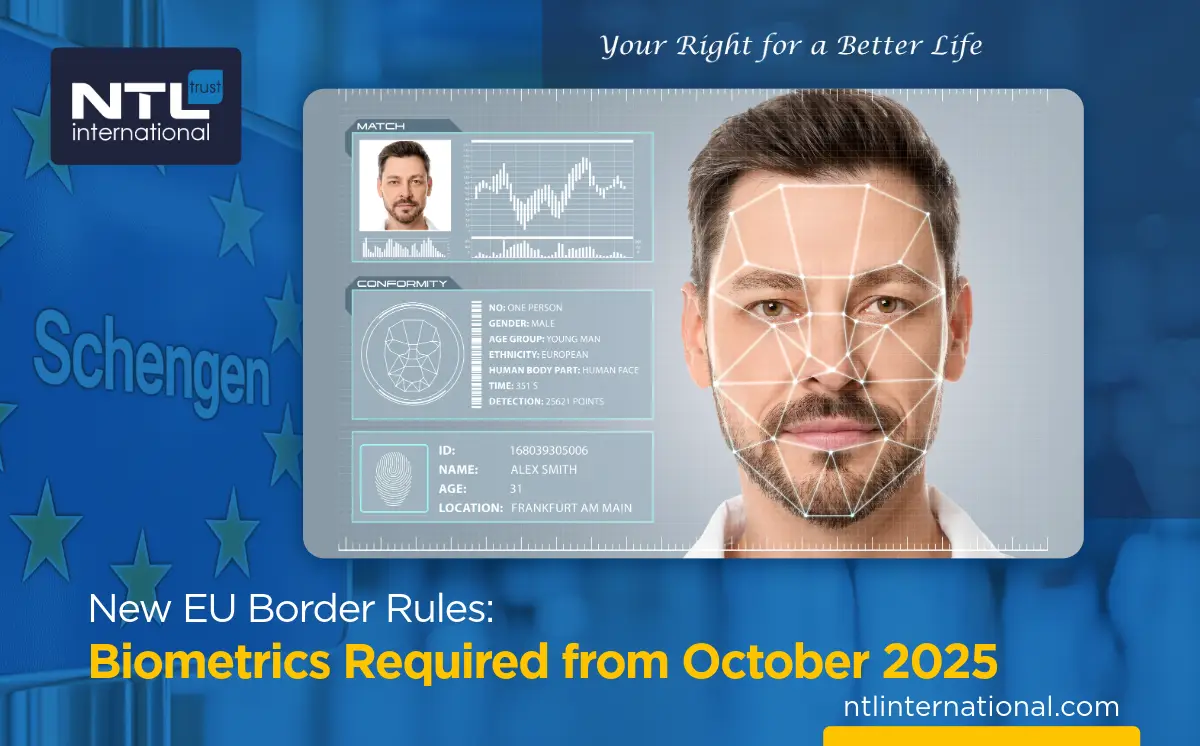
Starting 12 October 2025, the European Union will introduce the EU Entry/Exit System (EES) as part of the new EU Biometric Border Rules, a major shift in how non-EU travelers are processed at Schengen borders. The system will replace manual passport stamping with biometric checks, requiring fingerprints and facial photos, and will impact millions of visitors, including those entering with Schengen visas as well as nationals of visa-exempt countries such as the UAE, USA, and UK.
The goal of the EU Biometric Border Rules and the EES is to strengthen border security while ensuring a smoother, more efficient travel experience across Europe.
You may also be interested in:
Latest developments in the USA E2 Visa
What Is the EES?
The Entry/Exit System is an EU-wide digital platform that records the entry and exit of all non-EU nationals traveling to the Schengen Area. Instead of border officers stamping passports, travelers will be enrolled biometrically, with their data stored securely in the EU’s system.
The system will be launched in phases beginning in October 2025, with full implementation expected by 10 April 2026.
Who Will Be Affected by the new EU Biometric Border Rules?
The new EU Biometric Border Rules apply to all non-EU travelers entering the Schengen Area for short stays, whether for business, tourism, family visits, or transit.
- Visa holders: Anyone entering with a Schengen visa.
- Visa-exempt travelers: Nationals of countries like the UAE, USA, UK, Canada, Australia, and others.
- Children under 12: Exempt from fingerprinting but may still need to provide a facial photo.
What Will Change at the Border
From October 2025, travelers arriving at any external Schengen border, whether at airports, seaports, or land crossings, will undergo biometric registration on their first entry after the system goes live.
New Requirements:
- Fingerprint collection: Four fingerprints will be scanned electronically.
- Facial photograph: A live facial image will be taken at the checkpoint.
- Digital entry record: Personal details, travel documents, and entry/exit information will be stored in the EU system for three years.
How the Entry/Exit System Works?
- First entry after 12 October 2025: Travelers must complete the full biometric enrollment.
- Subsequent entries: For the next three years, verification will be faster, requiring only fingerprint or facial recognition.
- No pre-registration: Travelers do not need to apply online or complete forms in advance.
- No additional fees: Biometric enrollment is free of charge.
Impact on Travelers
The EES is expected to cause longer queues and processing times during the initial rollout, especially in late 2025 and early 2026. Once travelers have been enrolled, however, border crossing should become quicker and more efficient, with passport stamps gradually phased out.
Key Dates
- System launch: 12 October 2025
- Transition period: October 2025 – April 2026
- Full rollout: 10 April 2026
- Data validity: Stored for three years from first enrollment
Practical Tips for Travelers:
- To ensure a smoother journey once the EES is launched, consider the following:
- Arrive earlier than usual at airports and land borders, especially for your first entry after October 2025.
- Keep your passport, visa (if required), and travel documents ready for inspection.
- Families with children under 12 should note that fingerprints are not required, but photos may still be taken.
- Monitor updates from the European Commission and your local consulate before traveling.
NTL’s Advice
As an authorized government advisory firm, NTL recommends that all clients and travelers prepare for the new border procedures well ahead of time. For those applying for Schengen visas or planning business and leisure travel to Europe, our team will continue to provide tailored guidance and updates on the EES rollout.
Michael Martin is the new CEO of the St Kitts and Nevis CBI Unit
Michael Martin has been announced as the new CEO of CBI Unit in Saint Kitts and Nevis.
Starting work on the PVIP program in Malaysia
Starting work on the PViP program in Malaysia with the beginning of last October
The latest updates in the Turkish CBI law through real estate ownership
With the beginning of the new year, work will start in accordance with the latest updates of the Turkish CBI Law through real estate ownership.
Green Visa in UAE, longer stay & more facilities
Recently, the UAE has started receiving applications for Green Visas/residence permits.
As part of an ongoing effort to create new opportunities and attract a larger audience of investors and entrepreneurs, the UAE has introduced a new visa that allows its holder to reside in Dubai for 5 years, with the possibility of renewal.
President Erdoğan launches the largest housing project in Türkiye
The Turkish President Mr. Erdoğan, announced in a speech yesterday the work on the largest housing project in Turkey.





